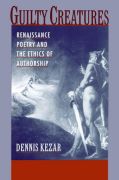
Guilty Creatures explores the concept of authorial guilt elicited by violentrepresentation in Skelton's Phyllyp Sparowe, Spenser's Faerie Queene, Shakespeare's Julius Caesar, the multi-authored Witch of Edmonton, and Milton's Samson Agonistes. This study examines how Renaissance poets conceive the theme of killing as a specifically representational and interpretive form of violence. Closely reading both major poets and lesser known authors, Dennis Kezar explores the ethical self-consciousness and accountability that attend literary killing, paying particular attention to the ways in which this reflection indicatesthe poet's understanding of his audience. Kezar explores the concept of authorial guilt elicited by violentrepresentation in poems including Skelton's Phyllyp Sparowe, Spenser's FaerieQueene, Shakespeare's Julius Caesar, the multi-authored Witch of Edmonton, and Milton's Samson Agonistes. In each case, he reflects on the poetic process and explores the ethical ramifications for both author and audience.In emphasizing the social, literary, and historical consequences of 'killing poems,' this volume further advances scholarship in historicist and speech-acttheories of the early modern period. Introduction1 Courting Heresy and Taking the Subject: John Skelton's Precedent2 Spenser and the Poetics of Indiscretion3 The Properties of Shakespeare's Globe4 The Witch of Edmonton and the Guilt of Possession5 Samson's Death by Theater and Milton's Art of Dying6 Guilt and the Constitution of Authorship in Henry V and the Antitheatrical Elegies of W.S. and MiltonIndex
- ISBN: 978-0-19-539794-9
- Editorial: Oxford University
- Encuadernacion: Rústica
- Páginas: 280
- Fecha Publicación: 28/07/2011
- Nº Volúmenes: 1
- Idioma: Inglés
